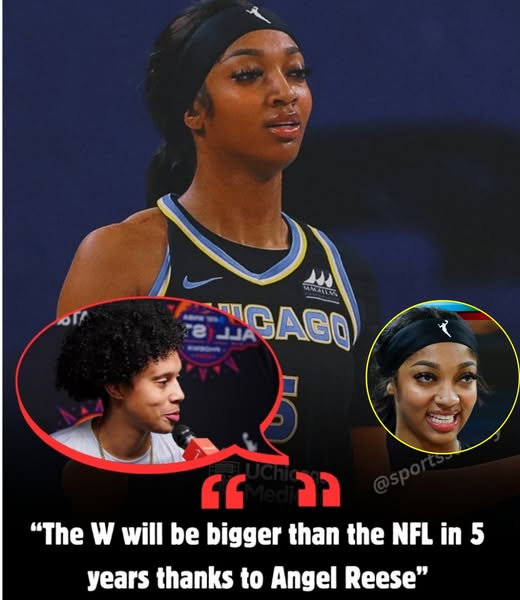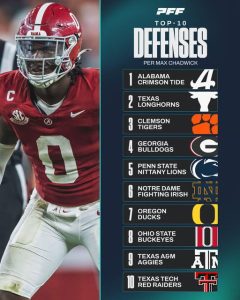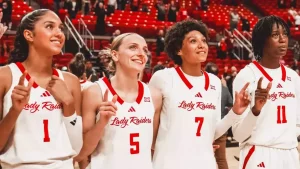
Brittney Griner, one of the most recognizable names in women’s basketball, is no stranger to bold statements and confident predictions. But her latest declaration has the sports world buzzing louder than ever. During a recent interview, Griner made headlines by stating that the WNBA will be bigger than the NFL in just five years, and she credits rising star Angel Reese as the primary catalyst for this monumental shift.
Griner’s claim isn’t just hyperbole. It’s a passionate belief rooted in the undeniable momentum the WNBA has gathered over the past few seasons. From record-breaking viewership numbers and sponsorship deals to the increasing cultural visibility of its players, the league is enjoying a golden era of growth. And for Griner, no one embodies this new wave of energy more than Angel Reese.
Known for her fierce competitiveness, unapologetic confidence, and magnetic personality, Reese has quickly become a household name in American sports. From her collegiate dominance at LSU to her viral moments on and off the court, she has elevated the profile of women’s basketball in a way few have before her. Her arrival in the WNBA wasn’t just a professional milestone; it marked a turning point in how the league markets itself, how fans engage with players, and how young athletes view their futures.
Griner sees Reese not only as a generational talent but as a cultural force. “She’s got it,” Griner said. “The swagger, the game, the voice. She’s not afraid to speak up, and people listen when she does. That’s the kind of star power that transcends sports.” And indeed, Reese’s influence stretches far beyond the hardwood. With millions of followers on social media, lucrative endorsement deals, and a knack for drawing attention to issues that matter, she’s part of a new era of athletes who blur the line between sports, entertainment, and activism.
Griner’s prediction of the WNBA overtaking the NFL in popularity might seem audacious to traditionalists. After all, the NFL has long been the financial and cultural juggernaut of American sports. But change often comes in waves, and the WNBA is riding one of its biggest yet. Last season saw an unprecedented surge in ticket sales, merchandise revenue, and primetime TV slots. More importantly, the league is capturing the attention of younger demographics, especially Gen Z fans who value authenticity, representation, and purpose-driven branding—qualities the WNBA and players like Reese deliver in abundance.
Moreover, the changing media landscape is giving women’s sports a platform like never before. With streaming services, social media, and digital-first coverage leveling the playing field, the barriers that once kept the WNBA in the shadow of male-dominated leagues are crumbling. Angel Reese has proven to be a master of this new media environment. Her social media presence isn’t just a highlight reel—it’s a lifestyle brand, an advocacy platform, and a direct line to a fanbase that feels personally connected to her journey.
Griner knows firsthand how far the league has come. Drafted first overall in 2013, she entered a WNBA that struggled for mainstream attention. Fast forward a decade, and players like Reese are entering a league with far more resources, visibility, and cultural cachet. “It’s a different world now,” Griner said. “Back then, we were fighting just to be seen. Now, we’re not just being seen—we’re being celebrated.”
The importance of players like Reese in this evolution cannot be overstated. She represents a generational shift in how athletes are marketed and perceived. She embraces the spotlight, isn’t afraid to be polarizing, and commands attention wherever she goes. In doing so, she opens the door for others to follow, creating a rising tide that lifts the entire league.
Some skeptics argue that comparing the WNBA to the NFL is apples to oranges. The NFL’s billion-dollar TV deals, massive stadiums, and century-long legacy make it a seemingly insurmountable behemoth. But Griner believes that influence and impact can’t solely be measured in dollars and decades. “It’s about relevance,” she explained. “It’s about who’s driving the conversation, who’s inspiring the next generation. And right now, Angel is doing that in a way we’ve never seen before.”
Indeed, Reese’s impact is visible in rising youth participation numbers, increased visibility for women’s college basketball, and more robust NIL (Name, Image, and Likeness) pipelines feeding into the pro ranks. She’s creating a blueprint for future stars who won’t have to choose between fame and integrity, or between individuality and team success.
Griner also points to the support ecosystem around today’s stars. Major brands are investing more in women’s sports. Broadcasters are offering better coverage. And fans are becoming more vocal and engaged. These elements, combined with a player like Reese at the forefront, create a perfect storm for exponential growth.
And it’s not just about one player. Griner is quick to highlight that Reese is part of a broader movement, one that includes fellow WNBA rookies, established stars like A’ja Wilson and Breanna Stewart, and legends who paved the way. But she sees Reese as the lightning rod. “She’s the one who can bring all these forces together. She gets the cameras rolling, the debates started, the energy flowing. That’s what the league needs if we want to reach that next level.”
There’s also the cultural moment to consider. As conversations around gender equity, representation, and social justice gain mainstream traction, leagues like the WNBA stand to benefit. The players are already leaders in these spaces, and their authenticity resonates with fans hungry for more than just scores and stats. Reese, with her outspoken support for racial and gender equality, is emblematic of this shift.
Griner’s confidence in the WNBA’s future is as much about infrastructure as it is about star power. The league is expanding, teams are investing in better facilities and marketing, and the business side is catching up to the talent on the court. This foundation, paired with the charisma and impact of players like Reese, could indeed position the WNBA as a dominant force in American sports.
Of course, challenges remain. The WNBA still faces disparities in pay, media coverage, and overall investment compared to its male counterparts. But Griner views these hurdles not as deterrents but as opportunities. “Every great leap starts with belief,” she said. “And I believe we’re on the edge of something historic.”
Whether the WNBA will truly overtake the NFL in popularity remains to be seen. But Griner’s bold prediction has sparked a conversation that forces fans, media, and stakeholders to reconsider what’s possible. If the league continues to grow at its current pace, fueled by athletes like Angel Reese who understand both the sport and the spotlight, then the future might not be as far-fetched as some think.
In the end, Griner’s vision is more than a prediction—it’s a challenge. A challenge to support women’s sports with the same fervor as men’s. A challenge to recognize that greatness comes in many forms. And perhaps most importantly, a challenge to believe in a future where the WNBA isn’t just surviving but thriving—at the very top.





